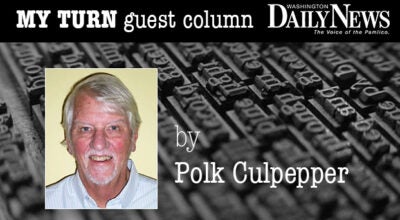Lessons from a virus: the foundation of resilience
Published 5:36 pm Friday, September 15, 2017
The 2014 West African Ebola was a different sort of hurricane, silently rolling through villages and towns over months, claiming over 10,000 lives. Among the many aid organizations that responded was the Department of Defense (DoD), which sent 3,000 military and civilian personnel including doctors, nurses and other public health workers, pilots, logisticians, those skilled in building temporary clinics and many other necessary groups. This contingent of folks ended up 24/7 in urban and remote rural areas in mostly English-speaking Liberia, supporting operations to stem the tide and track down the virus.
Even for an expeditionary force, the military found itself in the middle of the winds of the virus helping and working with Liberians who had vastly different ways of seeing and interacting with the world around them, including belief systems, their understanding and approach to the Ebola virus, their way of forming community and other differences.
Rural Liberian villages and urban neighborhoods alike were tightly knit and resilient communities that somehow provided strength and support against gut-wrenching poverty that permeated their waking moments. But the Ebola crisis threw them a curve. Their public health capability was nonexistent, some of their traditional healing included practices that actually spread the virus, and there was a mistrust of a western medical approach. In this crisis, it wasn’t marauding militia roaming the countryside, it was a microbe that quietly killed. Certainly, there were other reasons that created difficulty in the military and other agencies’ efforts to handle the virus, but some of those could be traced back to a lack of understanding of the Liberian people and their culture by those who were there to help. In many cases, it was bias — our preconceived notions about someone or something that is different — that stood in the way of understanding Liberians and their behaviors.
I worked in developing cultural training for military groups going to West Africa. One important goal was to alert them to possible biases and what their effect was on the mission. A second goal of training was to develop the ability to suspend those biases while critically taking others’ perspectives to find ways to help control the virus.
Our mind generates biases all the time; wariness of those not like “us” helped groups of people to survive in the past. But biases, from racism to just how you go about your day, stand in the way of creating community when many are different and we view their differences through a very narrow lens.
To build strong and resilient communities, it is the diversity of differences that often comes to the forefront to find and engage new and novel ways to confront adversity. But the rub is you have to cut through the bias that strangles our ability to see the benefit of difference. For the western health professionals in Liberia, this meant fighting through their bias of western medicine and using traditional healers to help fight the virus in ways that were consistent with traditional cultural beliefs.
Communities depend on social resilience to work together, not just to fight a virus or rescue a flooded neighborhood, but to help build and sustain programs that attack addiction, lack of economic growth, a lack of opportunity for jobs or recreation opportunity for all youth. To seed those programs means taking the fangs out of our biases. You can’t build programs if you can’t understand needs of those populations that will use them. How we see and judge populations such as seniors, at-risk populations like veterans with substance abuse, children of low-income families, local merchants on Main Street, waterfront walkers and endless other small communities can either be limiting or very liberating and useful in helping knock down the walls of the box we often find ourselves organizationally imprisoned by.
In business, it is return on investment which guides product development or expanding services. In building social resilience, the return on investment on managing bias and suspending judgement can literally be lifesaving.
Robert Greene Sands is an anthropologist and CEO of the nonprofit Pamlico Rose Institute for Sustainable Communities located in Washington.



